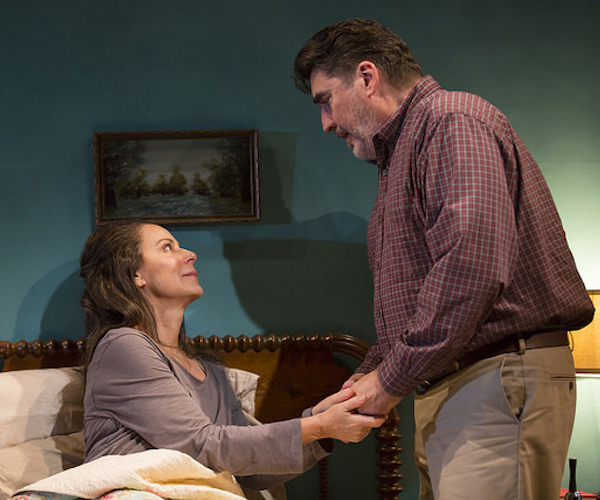Theater Review: “And No More Shall We Part” — Facing Mortality
This is a beautifully acted but grim 70 minutes of theater, a no-frills look at the dynamics of a struggle about life and death.
And No More Shall We Part by Tom Holloway. Directed by Anne Kauffman. Staged by the Williamstown Theater Festival at the Nikos Stage, Williamstown, MA, through August 21.

(L to R): Jane Kaczmarek and Alfred Molina in the Williamstown Theatre Festival production of “No More Shall We Part.” Photo: T. Charles Erickson.
By Helen Epstein
The right to take own’s own life in the event of incurable illness has, over the past decade, become a prime subject for journalists as well as authors, playwrights and screenwriters. It’s been 15 years since Derek Humphry’s Final Exit, a manual on how to take control of one’s own death, became a best-seller. As legislators, physicians, and bioethicists across the world continue to debate the morality of planning one’s final exit, writers have been dramatizing the scenarios. In recent, well-publicized cases, the person making the decision has been young, female, and unencumbered by a partner. In art, much of the drama is engendered by the complicating factor of a surviving spouse.
In the American book and 2014 film Still Alice, the disease is Alzheimer’s, and the suffering patient, married to a scientist husband, waits too long to take her life. In Amour, a 2012 French film directed by Austrian director Michael Haneke, a uxorious husband winds up killing his suffering wife. These four are depicted as complex, highly educated and upper middle-class people. Alice is a linguistic professor married to a biologist; the elderly couple are music teachers. They are also highly articulate. The husband and wife in Australian playwright Tom Holloway’s And No More Shall We Part are presented as none of these things.
We don’t learn much biographical detail about Don and Pam in this 70-minute two-hander, apart from the fact that they are middle-aged and have three grown children. What we learn about are the wrenching psychological dynamics of this decision on a long-married couple.
As the play opens, Pam is lying in a single bed reminiscing about a long-ago family camping trip. She appears cheerful, in control, absorbed in a nostalgic reconstruction of the past. He seems anxious, miserable, focused on this wife: “How do you feel.. Are you feeling anything yet…Nothing’s happening…something should be happening.”
We become, along with Don, witness to a planned suicide, as becomes clear in the second scene. Pam returns from a medical appointment to announce that she has decided to refuse further treatment for her illness. Her husband rages against her decision as well as against her doctor. He demands that they try to do everything medically possible to treat her illness. She refuses. She wants to die on her own terms.
And No More Shall We Part might be called “scenes from a marriage when one spouse has decided to die.” The pared-down script is, in director Anne Kauffman’s production, complemented by a pared-down, multi-room set by designer Rachel Hauck and adeptly lit by Matt Frey: a plain, almost drab dining area with a kitchen at its back; a bedroom with a single bed; a slice of living room with an upright piano visible.
This is a grim 70 minutes of theater, a no-frills look at the dynamics of a struggle about life and death, a study of marriage and abandonment between two people who are portrayed as having few resources or interests beyond the radio and the daily crossword puzzle and perhaps their children. Other relations, friends, jobs, and life-enhancing hobbies other than camping go unmentioned.
Kauffman has cast two brilliant actors in her production. I found myself unable to take my eyes off Alfred Molina, who portrays the sympathetic, straightforward, loving, doubting, terrified-of-being-abandoned Don. He brings a warmth to his character that helps infuse emotion into his often dispassionate, self-contained lines. Jane Kaczmarek has the more complicated and less sympathetic (at least in this production) role of the partner who chooses the illegal (in Australia) path of obtaining illicit drugs and ending her own life in the presence of her husband. She portrays Pam as determined and rational, bordering on the dissociated at times. The conflict between the two characters is all too real and never less than compelling.
And No More Shall We Part bears the burden of having to compete with newspaper accounts and documentaries by actual suicides, who have faced the same situation as Pam and have left detailed narratives behind. While providing a vehicle for accomplished performances, this drama from down under does not tell us or make us feel much that we do not already, regrettably, do.
Helen Epstein reviews for The Arts Fuse and is the author of eight books, all available at Plunkett Lake Press.
Tagged: Alfred Molina, AnneKaufman, Culture Vulture, Jane Kaczmarek, No More Shall We Part, Tom Holloway
